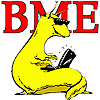Course learning outcomes
Students completing this course will be able to
- describe the research of two research lab groups in detail, in a way comprehensible to BMEB students not familiar with the lab group's topics,
- describe the general areas of research of several other lab groups, and
- write clearly about the current status of several research projects.
Homework
As a 2-unit course, BME 55 expects an average of 6 hours a week from all students. In a typical week, those hours break down as
- 1–2 hours in lab group meeting,
- 1 hour in class,
- 1–2 hours reading papers, and
- 1–2 hours writing summary.
Weekly, starting with second week, each student will write a 200–300-word report on the lab group being visited. This report is due at noon on Fridays (with a 2½-hour grace period for late submission). All reports must be submitted as single, readable PDF files on Canvas. Reports will not be accepted in other formats, nor will they be accepted by e-mail.
Late assignments past the 2½-hour grace period will not be accepted. If you need an extension, request it the day before the assignment is due (exceptions will be made for genuine emergencies, of course).
Feedback on homework will be provided on Canvas—be sure to click through to the submitted PDF file to read the feedback each week!
- By Wednesday of second week, report which lab group being joined, when it meets, and show permission to sit in on lab meeting. There will be a Canvas assignment to record this information.
- On Friday of the second week, the first report is due. It should give the name of the group being joined, the faculty leading the research group, and a brief summary of topics currently being researched. The information in the report should come from a combination of the lightning talk at the BME Lab Fair, subsequent conversations with the faculty, and any research web pages that the lab has.
- In the second week, every student will give an 2-minute elevator talk (no visual aids) giving an overview of the topics of the lab they are sitting in on.
- Each week after the first, students will do a written report (200–300
words, not counting the reference list) on one of three topics:
- the main topics of research for the lab,
- a paper they have been given to read by the lab group,
- a recent presentation in the lab group meeting.
- Each week after the first, a subset of students will do a presentation on the topic of their lab group. Presentation styles will vary through the quarter (8-minute presentations with slides, elevator talks, posters, videos, … ).
Evaluation
This course is a P/NP course, and students will be graded on attendance and satisfactory completion of assignments. Each written assignment is worth one point (except the final reflection, which is worth 2 points), attendance at each class is worth one point, and each presentation is worth one point (in addition to the attendance point for that day).
The total number of points depends on whether we have to increase
the number of class periods in order to fit in all the presentations
(which depends on the number of students in the course), but the
initial design of the course has 10 sessions for
attendance, 14 13
points for documents to submit (including the permission-to-join
acknowledgments and a video),
and in-person
presentations3 presentations (2
live, and one video), for a
total of 3026 points.
Students need 2522 points to pass the class.
Schedule
| Date | Meeting Topic(s) | Due |
|---|---|---|
| Fri 2022 Apr 1 | BME Lab Fair | |
| Wed 2022 Apr 6 | NA | show permission |
| Fri 2022 Apr 8 | Brief verbal reports on what labs are being attended and what the main topics of the lab are. | 200–300-word description of lab 1 |
| Fri 2022 Apr 15 | First half of class give 8-minute presentations with slides | written report on lab group meetings or research paper |
| Fri 2022 Apr 22 | Second half of class give 8-minute presentations with slides | written report on lab group meetings or research paper |
| Thurs 2022 Apr 28 | NA | Permission to join second lab group |
| Fri 2022 Apr 29 | 3-minute elevator talks on first lab | written report on lab group meetings or research paper |
| Fri 2022 May 6 | 3-minute elevator talks on 2nd lab | 200–300-word description of lab 2 |
| Fri 2022 May 13 | 8-minute presentations (first half) | written report on lab group meetings or research paper |
| Fri 2022 May 20 | 8-minute presentations (second half) | written report on lab group meetings or research paper |
| Thurs 2022 May 26 | 5-minute video (submit link to video through Canvas—be sure to share the video with karplus@soe.ucsc.edu, so that I can access it). Videos can be on YuJa, Google Drive, or other places I can download from. | |
| Fri 2022 May 27 | 5-minute videos presented | written report on lab group meetings or research paper |
| Fri 2022 Jun 3 | Discussion about BMEB curriculum, career advice, … | written report on lab group meetings or research paper |
| Tues 2022 June 7 7:30–10:30 p.m. | Final exam slot (no meeting planned) | 500-word reflection on whole course and future plans. |
Required boilerplate for syllabi
Academic integrity
You will be writing and speaking in this course mainly about other people's work, and you must make it clear whose work you are talking about. When speaking, try to attribute the ideas to the appropriate grad student, postdoc, or other researcher you got the ideas from. When writing, cite all the papers and web sites you refer to, using any standard bibliography format. Avoid using direct quotes or close paraphrases in your writing, but restate the ideas in your own words—never start any piece of writing with cut-and-paste of someone else's work.
Plagiarism is rare in this course, but if it occurs, it will be reported as an academic-integrity violation, and you will fail the course.
Accommodations for disability
If you are a student with a disability who requires accommodations to achieve equal access in this course, please submit your Accommodation Authorization Letter from the Disability Resource Center (DRC) to me privately during my office hours or by email, preferably within the first two weeks of the quarter. I encourage all students who may benefit from learning more about DRC services to contact the DRC by phone at 831-459-2089 or by email at drc@ucsc.edu.
Other resources
The campus administration has asked faculty to pad their syllabi with five pages of (mostly non-academic) resources. You can find many of these resources at https://studentsuccess.ucsc.edu/, https://lss.ucsc.edu/, https://basicneeds.ucsc.edu/campus-resources%20/health-wellness.html, and https://titleix.ucsc.edu/resources/related-websites.html.
|
|
|
Biomolecular Engineering
University of California, Santa Cruz
Santa Cruz, CA 95064
USA
karplus@soe.ucsc.edu
1-831-459-4250
318 Physical Sciences Building


